I’ve lived in both worlds.
I’ve been a six-figure freelancer writer, but now I focus on hiring writers to produce best-in-class, long-form content for our clients.
(Which is shorthand for sitting back with my feet up, cigar and cognac in hand, twirling my mustache, counting piles of c-notes.)
In the last year, we’ve reviewed over 2,500 applicants who wanted to be a freelance blogger. And spoiler alert: We haven’t hired anywhere near that number.

Freelance blog writers are one of the most in-demand SEO jobs and they are the right choice in specific scenarios. There’s a time and a place where they excel. It can work beautifully. Or it can backfire miserably.
That’s what this post is about.
Hiring a freelance blog writer seems like an obvious choice when you need content. But, it’s not always the right move.
Here’s how to set yourself up for success and avoid common mistakes before they happen.

Get long-term ROI.
We help you grow through expertise, strategy, and the best content on the web.
Industry Specialization
Pro: Good freelance blog writers have in-depth industry knowledge.
What typically happens when marketers write stuff for sales teams?
The short answer is that it sucks.
In theory, the two worlds are related. Adjacent even.
But are most marketers good at writing sales copy? No.
Why? Because most marketers have never sold a damn thing in their life. They’ve never faced rejection daily. They’ve never cold-called prospects and had to get their point across in less than ten seconds before being hung up on.
They don’t understand (or appreciate) the nuance salespeople look for.
The same holds true for freelance blog writers themselves. Writing blogs requires writing skills to get writing jobs. But that has zero to do with the art of selling and marketing.
Your goal should be marketing copy that reads as if a marketing professional wrote it. Not a freelance writer. The same is true for every blog post or content you put up on Facebook or LinkedIn.
Finding one person to fit this bill is doable. It’s tough, but possible if you look hard enough and have a decent budget to work with.
Simple: Go to the big blogs in your space, pull up the ones you like, and Google the author’s name. Chances are they freelance. And work samples often trump all other hiring B.S.
Con: A freelance blog writer’s specialization is usually limited.
If finding one person with experience in your niche is doable, finding a few is excruciatingly difficult (see “Scale” below).
And that’s an issue because someone who’s well versed in one area of your industry might not be in others.
Take SEO.
In just one subset of digital marketing, you have at least eight specialties, including:
- Technical SEO
- Analytics
- Site Architecture
- Keyword research
- On-page
- Content
- PR and outreach
- Viral social
You wouldn’t hire one marketer to do all eight of those things, because what makes someone good at the technical side is usually a hindrance in another (like PR).
Even the best, T-Shaped Marketers still specialize in one or two areas, tops.

This means you can’t hold a single writer to the same standard, either.
This is a significant issue because this is ultimately what you’re paying for when you hire a freelance blog writer.
You’re not just hiring a content writer with good grammar and style. Those are a dime a dozen on Fiverr or any other content writing or freelance writing site.
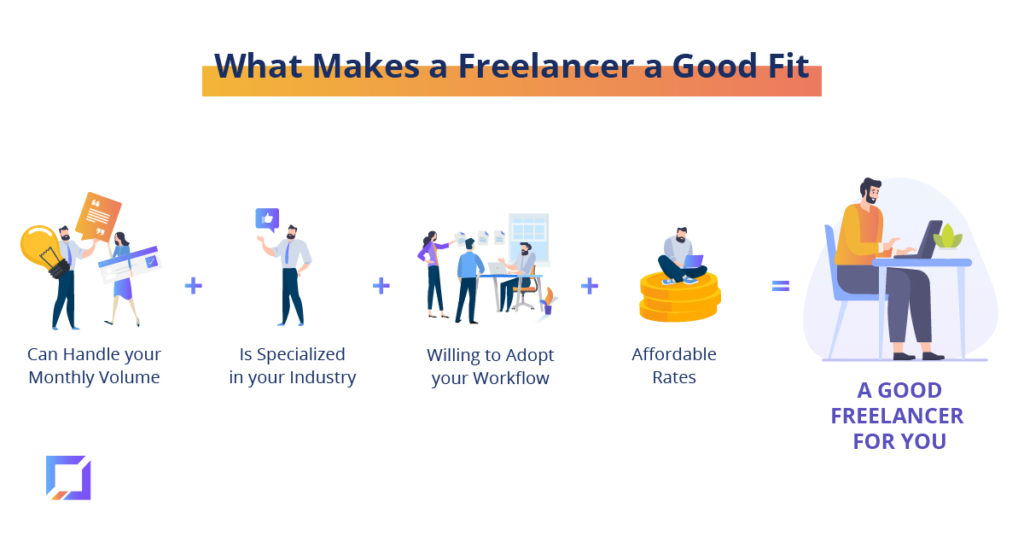
Instead, you’re hiring a professional blog writer who know what they’re actually talking about in a technical, ever-changing landscape.
Of course, they won’t tell you this. They won’t admit they’re strong in one area while weak in another. The social one looks flawless. But the canonicalization one is way off.
That’s just something you need to find out the hard way after the first few posts.
How do you find freelance writers for your industry?
Let’s say you wanted to go the freelance route. We get it. A professional freelance writer will be a major asset to your writing project.
But how exactly do you narrow your search to find a content writer who genuinely knows your industry?
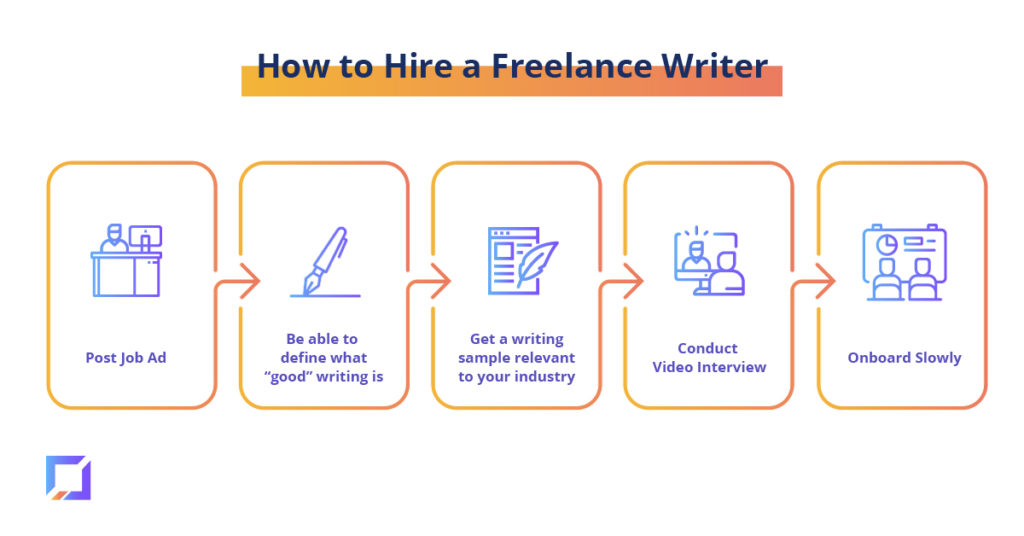
1. Go to a freelance job posting site.
Upwork, Fiverr, and Contently are popular platforms, but you can get a really good idea of the challenges of hiring a freelance writer by looking at Problogger’s job board.
2. Create a detailed brief (job post) of what you’re looking for.
This is the first hard part. You obviously know your industry, but you may not know content marketing or writing – after all, that could be why you’re looking for a freelance writer. Still, you’ll have a higher rate of success if you’re able to outline how you separate a good article from a bad article. Remember, freelancers are likely to only do what you ask, unlike a content marketing agency that’s focused on improving your content.
3. Ask for a writing sample relevant to your industry.
We see a lot of companies make the same mistake when hiring freelance writers – they only check to make sure the writer knows how to write. And yes, that’s important. But it’s more important that they know how to write in your industry.
4. Ask for a video interview.
You might be thinking – man, this is a lot of work. Writing is difficult, and writing for a brand and towards an audience takes a village. You want to do a video interview because you want to be able to:
- Confirm the writer is who they say they are.
- Talk to the writer about their sample to confirm they actually wrote it.
5. Onboard slowly.
When you find a writer who is a good fit, you might be tempted to just start assigning them all of the content you can. This is a mistake. The writer still needs to learn to write like your company. We recommend assigning them 1-2 articles for the first week, providing detailed feedback on those articles, and then slowly scaling up their services.
As you can see, this is a lengthy process.
Hiring a freelance writer isn’t the same process as hiring freelance designers or developers. In both of those fields, it’s easier to articulate the knowledge gap. You can tell a designer (or show them) what you like or don’t like about an infographic they made.
But talking about writing skills is more abstract. Most people will just say, “I don’t know why, but I don’t like this article.” They might say the “tone” is off, or it’s “too conversational,” but those are subjective terms. And subjective terms are hard to qualify and scale.
Whereas, a professional writer or a content marketer can say, “this lead is too long, and data shows that engagement will drop off before the reader gets to the first CTA, likely hurting our conversion rate. Plus, more than half of this content is in the passive voice, which we’ve seen correlate to shorter on-page times.”
Client Specialization
Pro: Good freelance writers get up to speed quickly.
This is where freelance blog writers can excel.
You DO want to consistently work with the same writer, because it gives them a chance to absorb your preferences, criteria, tone, style, examples, and even invoicing instructions.
Your workflow is specialized. Rightfully so.
And working with fewer people over a longer period gives you that chance to overcome these issues ASAP, so they become like an extension of your team.
The problem is that I can almost guarantee it’s going to take you longer (and require more effort) than you initially think to find and successfully onboard them. Here’s why.
Con: A freelance writer puts all your eggs in one sketchy basket.
The higher-ups hand you ambitious growth goals.
You need X visits, Y leads, and Z conversions in the next quarter.
That means you’ll need a writer (or writers, plural) up and running within the next two weeks.
What happens if they don’t work out? You’re screwed — wasting both time and money that you can’t afford.
Freelance writers get paid to write. However, they’re not always the best at all the other stuff. Like deadlines, for instance. Or plagiarism, which ClearVoice found several examples of when studying ‘cheaper’ writers.

Remember, a freelance writer is likely juggling multiple clients (probably more than they should) because they need to make a certain amount of money (and probably aren’t charging enough per piece). But the end result — for you — is no different.
So you’re going to need to test a few to hire one or two.
If it sounds like a lot of work, it’s because it is. Your strategy needs to change from finding that one special someone to assuming a few who look great on paper won’t work out in the end.
And then get through that period as quickly as possible, so it doesn’t derail what the C-Suite is expecting in twelve weeks and counting.
Rates vs. Quality
Pro: Good freelance writers typically charge more.
ClearVoice also found that the best technology writers typically charge a lot, yet are still ‘less expensive’ in both hard and soft costs for brand marketers.
Generally speaking, I’ve found this to be true. You can easily make a few broad, generalizations:
- Better writers charge more.
- Writers that don’t charge much do so for a reason (they aren’t very good).
The trouble is that you need excellent writers when the SERPs (a proxy for how most people will find you) are winner-take-all markets with slim margins for error.
However, there is a giant caveat with this one.
Because while people at the top of the market are good, the middle is murky as hell.
Con: There are lots and lots of bad freelance writers.
We’ve hired around five in-house writers in the last year.
But we’ve probably reviewed close to ~2,400 to date.
That’s not a typo. The conversion rate will make you weep. (Whiskey helps.)
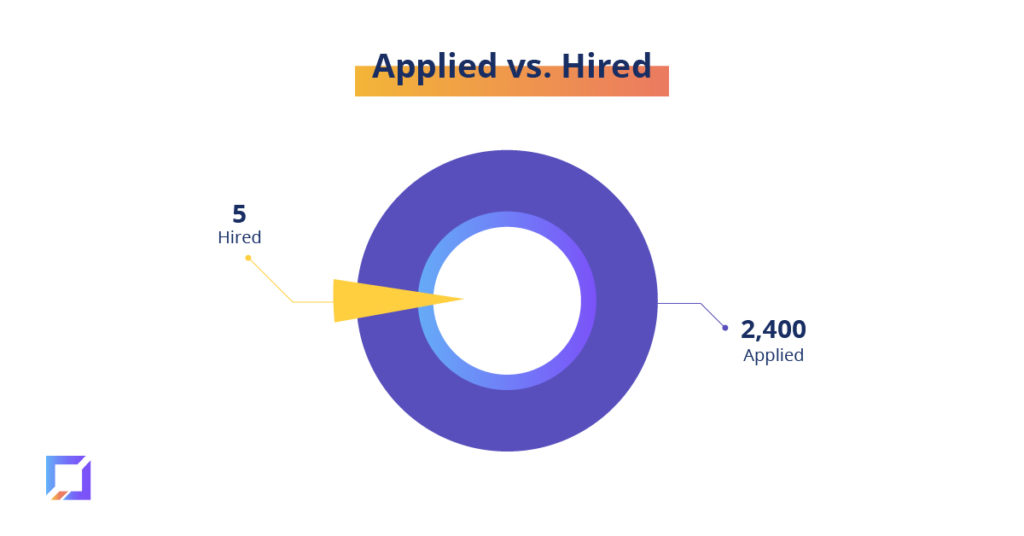
There are many reasons why it’s so difficult to find good writers. However, that’s a post for another day.
A big problem that we’ve seen is the odd relationship between the hourly rate and quality.
It’s “odd” because there’s virtually none within a certain range. Super low rates are garbage, really high rates are solid, and everything in between? Inconsistent as hell. Paying for freelance writing is about as confusing as paying for influencer marketing.
Tell me…
What do you think is a fair rate for an article? Ten people will give you ten different answers.
Just take a gander at the latest jobs on Contently for Exhibits A through J:

Here’s the question that can help you figure out what an ‘appropriate’ rate looks like.
What, exactly, are you paying for?
Words? Or results? Are you paying a blog writer to just produce articles for you, or are you paying a writer who understands content marketing – that is, who writes with their audience in mind?
One issue is that your (the client’s) definition of quality vs. the writer’s definition of quality are two vastly different things. Worlds apart sometimes.
Yours might include visits, links, shares, conversions, revenue. Meanwhile, theirs includes word choice, flowing prose, and tactical accuracy.
Content is still subjective at the end of the day. Your goal is to make it a little less subjective.
Having solid blog KPIs is a good start to bridge the gap. It starts by getting you both on the same page, agreeing to the same strategy.
Some topics lend themselves well to social media shares, others maximizing time on site, while others still for assisting conversions.
If a writer is tasked with pitching you these ideas, they should know the target they’re aiming at. Otherwise, they’ll put their head down and do ‘good work’ while your bottom line remains unchanged.
How should you pay your freelance writers?
Let’s say you decided to post a freelance writing job description on Problogger. You found a writer with samples related to your field. The writer passed the interview, and you want to hire them.
What’s the best way to pay them?
We talked above about the various terms – per hour, per article, per word. But which one works the most in your favor?
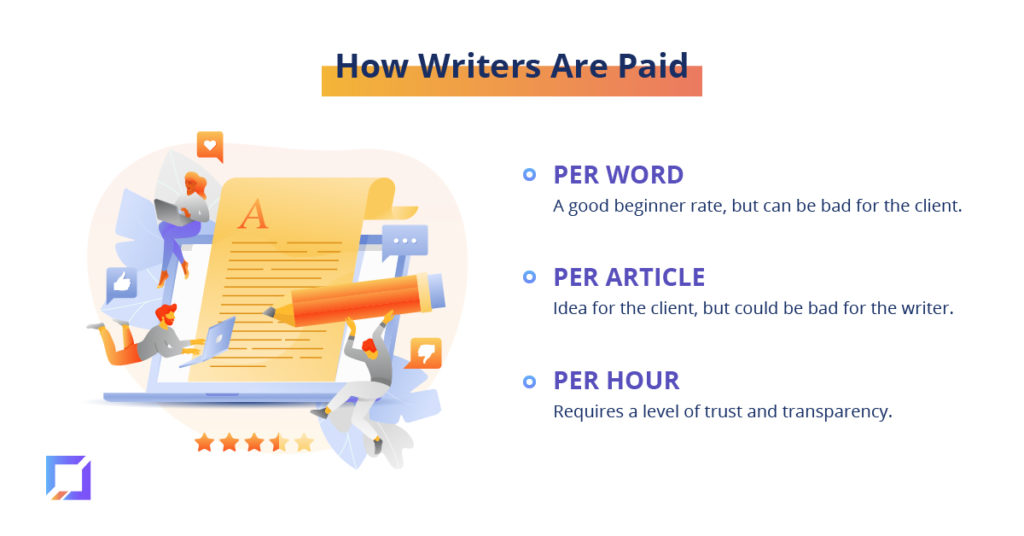
Here are some things we’ve found after working with hundreds of freelance writers.
The more experienced the writer, the less likely they are to charge per word.
This isn’t us attacking writers who list their rate as per word. Sometimes a writing project benefits from a per word rate.
But, a per word rate can also work against you because a writer may add fluff (read: bad writing) to make a word count or will quit an article early (even though it hasn’t covered the topic thoroughly) because they know their max pay is .10 a word at 4,000 words. Why would they write 5,000 and not get paid?
That doesn’t mean paying per article or per hour doesn’t have its drawbacks. Unless you’re comfortable with a freelance writer – as in you’ve worked with them for months and trust them – we’d be cautious about charging per hour. Great content will take hours upon hours to produce, but you don’t want to give away all oversight and just trust that the writer is charging appropriately.
A per article rate is generally a safe and strategic way to pay your freelance bloggers, though make sure you’re assigning them fair content at a fair price. Writers learn quickly to value their time, and if they keep getting crazy long, 6,000 word+ article assignments from you, they might push back or (more likely) take their blogging skills elsewhere and quit responding to your emails.
What happens when you don’t like the submitted work?
People forget to discuss this, and it’s never pretty when it comes up late in the game. Blog writing is difficult and filling a blogging job with freelance writers is a process.
The only way to hire a writer who delivers blog content that you don’t end up editing (even just a little) is to lower your standards. And that’s no good. The goal is always to elevate content quality to new heights, and not to settle.
To help with this, make sure your freelancer will perform revisions and edits on their work. Now, how many revisions and how many hours of edits is a tricky thing. (Another con for hiring by the hour is it can motivate you, the client, to do the edits yourself –– in which case, what good is a writer?)
Ideally, a quality content writer will want you to be happy with their work. Good content writers are hard to come by, but so are good content writing jobs. When a writer finds one that pays well, they generally want to keep it.
However, the goal needs to be the same for both the writer and the client: eventually, after submitting so many articles, edits will practically be non-existent.
Ability to Scale
Pro: Freelancers are good if you’re looking for 1-4 pieces of content each month.
Top freelance blog writers can only crank out ~4-5 pieces of content each week. They could and should probably be able to do more. However, they’re often restricted to only ~50% utilization because of all the other freelancing-related ‘stuff’ to deal with, like:
✓ Self-promotion
✓ Sales
✓ Edits on other pieces
✓ Social & email
✓ Phone calls to needy clients
✓ Invoicing
✓ Chasing overdue invoices from dead-beat clients
✓ And you know, possibly spending some time with loved ones
And if they’re not doing those things? They won’t be freelancing very long.
One of the better estimates I’ve seen is ~25,000 words a month as an accomplishment for freelance writing gigs, which breaks down to around 7,500/week, or the equivalent of six long-form articles.
This isn’t exclusive to freelance writing jobs. Most in-house writers are no different in this respect. They’ll also cap out at a certain point around ~5/week, due to meetings, email, open office floor plans, etc. etc.
That means freelance blog writers are often better suited to lower volume (~1-4/month) work.
Otherwise, you’re forced to find and wrangle and manage a ton of different ones, which brings us to the Con.
Con: Freelance blog writers don’t scale well for high-volume work.
Four posts per month is a respectable quota. But it’s often not enough to compete in hyper-competitive niches.
That’s even more exacerbated in content-driven spaces, like large affiliate sites, where we’ve done 50+ long-form pieces over the course of a month.
Yes, quality is important. But quantity still gets results, too.
HubSpot fueled their inbound marketing craze by publishing upwards of 10 posts per day. They’ve found (and published) results like this for the better part of a decade (this one’s from 2015):
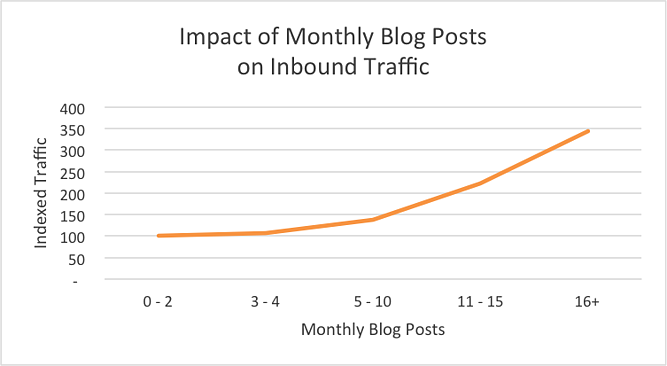
They maintain that more content often leads to more leads. And it made them a public company.
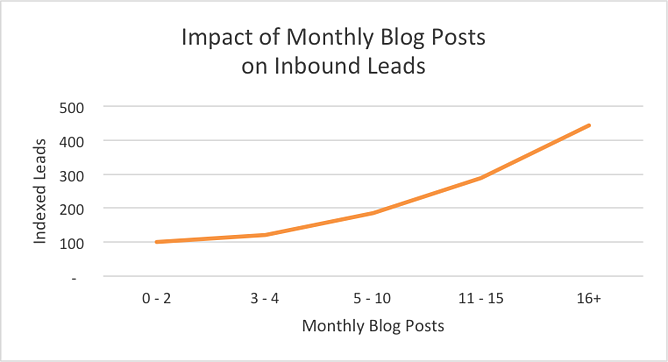
Now, is this always the case? Of course not. You can drive a lot of leads with less content.
However, I’d argue that it’s easier (read: higher probability of success) of doing it with more content than less.
The more content you produce for your niche, the more queries you can answer, and the more people you can reach. (Digital marketing’s not exactly rocket science at the end of the day.)
You can fuel this content-creation furnace with freelance blog writers. Personally, though? I wouldn’t.
Think about the numbers:
A successful freelance writer might top out around 5/week. Let’s say you take over every single one of their client slots (which is doubtful). You’d still have to recruit and hire, and onboard and train, and manage a team of freelance writers.
In other words, a bunch of different people with different styles and different voices. Working with freelancers to do all your content marketing and blog posts is akin to herding cats.
It’s an inefficient process unless you’ve dedicated someone (or a few ‘someones’) solely to this project.
Unfortunately, most traditional agencies are often just as inefficient.
Plus, you get saddled with a bunch of ‘extras’ like consulting and research and analysis and reporting. This means a few articles is going to set you back $10-20k/month if they’re good. (Which many aren’t.)
So once you start moving to a few posts each week, you’ll often need multiple people contributing.
The Verdict: When (and When Not) to Hire Freelance Blog Writers
Let’s recap.
Hire freelance blog writers when:
You expect relatively low-volume from each individual.
Crave expertise for a few, specialized topics.
Need them to adopt your workflow ASAP.
And last but not least: You can afford to pay top-end rates.
Tick those four boxes, and you’re as good as gold.
You’re setting them up for success from the start. This means your odds of achieving success (as you’ve defined it) will be better.
Scaling content isn’t easy.
Sourcing, hiring, managing, and training a team of freelance blog writers is one way to do it. IF you know what you’re getting yourself into. And IF you have dedicated internal resources to devote. (Read: A ringmaster to manage the circus.)
Or you can just call us.




